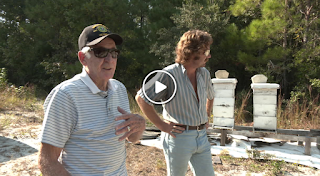Beekeepers are noticing their bees dying from aerial spraying
A local beekeeper is upset with elected officials after hundreds of honey bees died from Aerial spraying for mosquitoes. He says he did everything he was told by the county to protect his bees, but it wasn’t enough. Now, he’s waiting to see if the county will reimburse him for his loss.
“The chemical was supposed not to last but a few minutes after they sprayed it,” says Hubert Lowe.
To lose so much you worked hard for in just a matter of hours.
“We lost about five to 600 per hive,” Lowe says. “It takes a lot of work. People don’t realize how much work is in them.”
Beekeepers Hubert Lowe and Nathan Ingiram take great pride in their bees, being a few in a colony of keepers.
Keelin: “How does it make you feel?”
Hubert: “Disgusted with it the way it is now. The spraying and killing of them cost all of this. We would like to recover it, but you can imagine how much it cost to replace them.”
Nathan: “When he was coming up and my great-granddaddy had bees, they didn’t have any these pesticides and sprays and stuff. It has made it harder for the bees to get by.”
So, you can imagine their feelings on October 12th, to see some of their bees dead, allegedly by a strong insecticide.
“We’ve got samples, I showed you. We’re going to send it to them and let them see what chemicals are in them,” Lowe says.
The insecticide was sprayed by Vector Disease Control International. Now, the dead bees are getting tested by the state of North Carolina. Which Lowe says may take a long time.
“I hope it’s not six months,” Lowe says.
A packet given to Lowe from the EPA shows the chemical Dibrom, is “highly toxic to bees exposed to direct treatment on blooming crops or weeds. ” It’s also recommended to be sprayed, “when bees are least active.”
“They have to pollinate a tremendous amount of food and without bees, people wouldn’t have half to eat. Especially the vegetables,” Lowe exclaims.
Lowe has 16 hives with about 50,000 bees in each one.
“It’s good for the community. Everybody enjoys eating the honey, and not to mention what it does to everybody’s flowers in their yards,” Ingiram says.
And he’s afraid more will die as the county continues to spray during the week. Lowe and Ingriam both say they are not against mosquito spraying. They also say this isn’t the first time their bees were killed from the insecticide. They remember it happening when the county sprayed after Hurricane Florence.

